Felicia Sorel (September 28, 1903 – September 7, 1972) was a dancer, choreographer, and dance educator, based in New York City.
Felicia Sorel | |
|---|---|
 Felicia Sorel, from a 1921 publication | |
| Born | September 28, 1903 New York City |
| Died | September 7, 1972 Las Vegas, Nevada |
| Occupation(s) | Dancer, choreographer, dance captain, dance educator |
| Spouse | Gluck Sandor |
Early life and education
editSorel was raised in Brooklyn Heights; her father was a physician, and her mother taught music.[1] She trained as a dancer with Michel Fokine, Vicente Escudero, and Mary Wigman.[2]
Career
editSorel was proficient in several genres of dance, including modern,[3] black bottom,[4] and flamenco.[5] She danced in Broadway shows including The Rose of Stamboul (1922), Michio Itō's Pin Wheel (1922), The Earl Carroll Vanities (1925), After Such Pleasures (1934), and Saluta (1934). She later worked as a choreographer on Broadway, including Pins and Needles (1937), Jeremiah (1939).[6] The Gondoliers (1940),[7] The Mikado (1940), The Pirates of Penzance (1940), The Trojan Women (1941), The Pirate (1941 to 1943), Run, Little Chillun (1943),[8] My Dear Public (1943), Lysistrata (1946), King Henry VIII (1946 to 1947), and Louisiana Lady (1947). "Her gifts as a dancer have long been recognized," wrote The New York Times dance critic John Martin of her work on Everywhere I Roam (1939), adding that she showed additional promise as a choreographer, "designing dances for dramatic productions, and she has done it brilliantly and without compromise."[6]
Sorel taught at the American Theatre Wing and the American Academy of Dramatic Arts. She also opened[9] and ran a dance studio and a dance company with her first husband.[2][10][11] Jerome Robbins was one of their students.[12][13][14] During the 1930s she worked in the Works Progress Administration.[15] In 1943 she helped to create the Negro Dance Company,[16][17][18] and gave a recital at the Labor Stage Theatre.[19]
In 1949, she launched Sorel Productions, "specializing in promotion, production and staging of fashion shows and industrial exhibits."[20]
Personal life
editSorel's first husband was fellow dancer Gluck Sandor.[10] She died in Las Vegas in 1972, from cancer, at the age of 66.[2]
References
edit- ^ Oppenheim, Beatrice (1931-03-29). "Dancer Wins Fame With Sketches". The Brooklyn Daily Eagle. p. 81. Retrieved 2023-03-30 – via Newspapers.com.
- ^ a b c "Felicia Sorel Dies; A Dancer, Teacher". The New York Times. 1972-09-09. ISSN 0362-4331. Retrieved 2023-03-30.
- ^ "Unique Dance Exhibition Given at Monday Club". The Herald-News. 1934-03-20. p. 7. Retrieved 2023-03-30 – via Newspapers.com.
- ^ "'Black Bottom' Succeeding Charleston". The La Crosse Tribune. 1926-10-31. p. 6. Retrieved 2023-03-30 – via Newspapers.com.
- ^ "'Evening of Ballet' Has Debut as 3,422 Cheer". Daily News. 1937-12-13. p. 514. Retrieved 2023-03-30 – via Newspapers.com.
- ^ a b Martin, John (1939-01-22). "The Dance: Felicia Sorel, Composer; A Concert Artist Makes a Distinguished Debut as a Dramatic Choreographer--Events of the Week and After". The New York Times. ISSN 0362-4331. Retrieved 2023-03-30.
- ^ Shipley, Joseph T. (September 21, 1940). "Felicia Sorel Handles Choreography for 'The Gondoliers'". The New Leader. p. 6 – via ProQuest.
- ^ "William L. Cash Jr. and Felicia Sorel Pay N.C.C.N. Visit". The Herald-Sun. 1946-10-26. p. 8. Retrieved 2023-03-30 – via Newspapers.com.
- ^ "Dance Centre Opens; Gluck-Sandor and Felicia Sorel Seen in 'Petrouschka'". The New York Times. 1931-08-29. ISSN 0362-4331. Retrieved 2023-03-30.
- ^ a b "Gluck Sandor papers". Jerome Robbins Dance Division, New York Public Library for the Performing Arts. Retrieved 2023-03-30.
- ^ "New York Dancers to Appear; Gluck-Sandor, Felicia Sorel to Present Ballet Company in Los Angeles". The Los Angeles Times. 1932-10-02. p. 42. Retrieved 2023-03-30 – via Newspapers.com.
- ^ "The Uncompromising World of Jerome Robbins". BBC World Service. Retrieved 2023-03-30.
- ^ Kriegsman, Alan M. (1979-03-04). "The Memoirs Can Wait". Washington Post. ISSN 0190-8286. Retrieved 2023-03-30.
- ^ Lawrence, Greg (2001-05-07). Dance with Demons: The Life Jerome Robbins. Penguin. ISBN 978-1-101-20406-1.
- ^ Ingber, Judith Brin (June 23, 2021). "Modern Dance Performance in the United States". Jewish Women's Archive. Retrieved 2023-03-30.
- ^ Nicholas, Larraine; Morris, Geraldine (2017-07-14). Rethinking Dance History: Issues and Methodologies. Taylor & Francis. p. 50. ISBN 978-1-134-82763-3.
- ^ Lewin, Yaël Tamar (2015-08-14). Night's Dancer: The Life of Janet Collins. Wesleyan University Press. p. 114. ISBN 978-0-8195-7115-1.
- ^ Allen, Kelcey (November 30, 1942). "Negro Dance Co. Announces Personnel". Women's Wear Daily. p. 3 – via ProQuest.
- ^ Martin, John (1943-06-03). "The Dance; Felicia Sorel in Recital". The New York Times. ISSN 0362-4331. Retrieved 2023-03-30.
- ^ "Felicia Sorel Forms Sales Promotion Firm". Women's Wear Daily. June 29, 1949. p. 46 – via ProQuest.
External links
edit- Felicia Sorel at IMDb
- Felicia Sorel at the Internet Broadway Database
- A 1926 photo of Felicia Sorel and Paul Ash by George Rinhart, at Getty Images